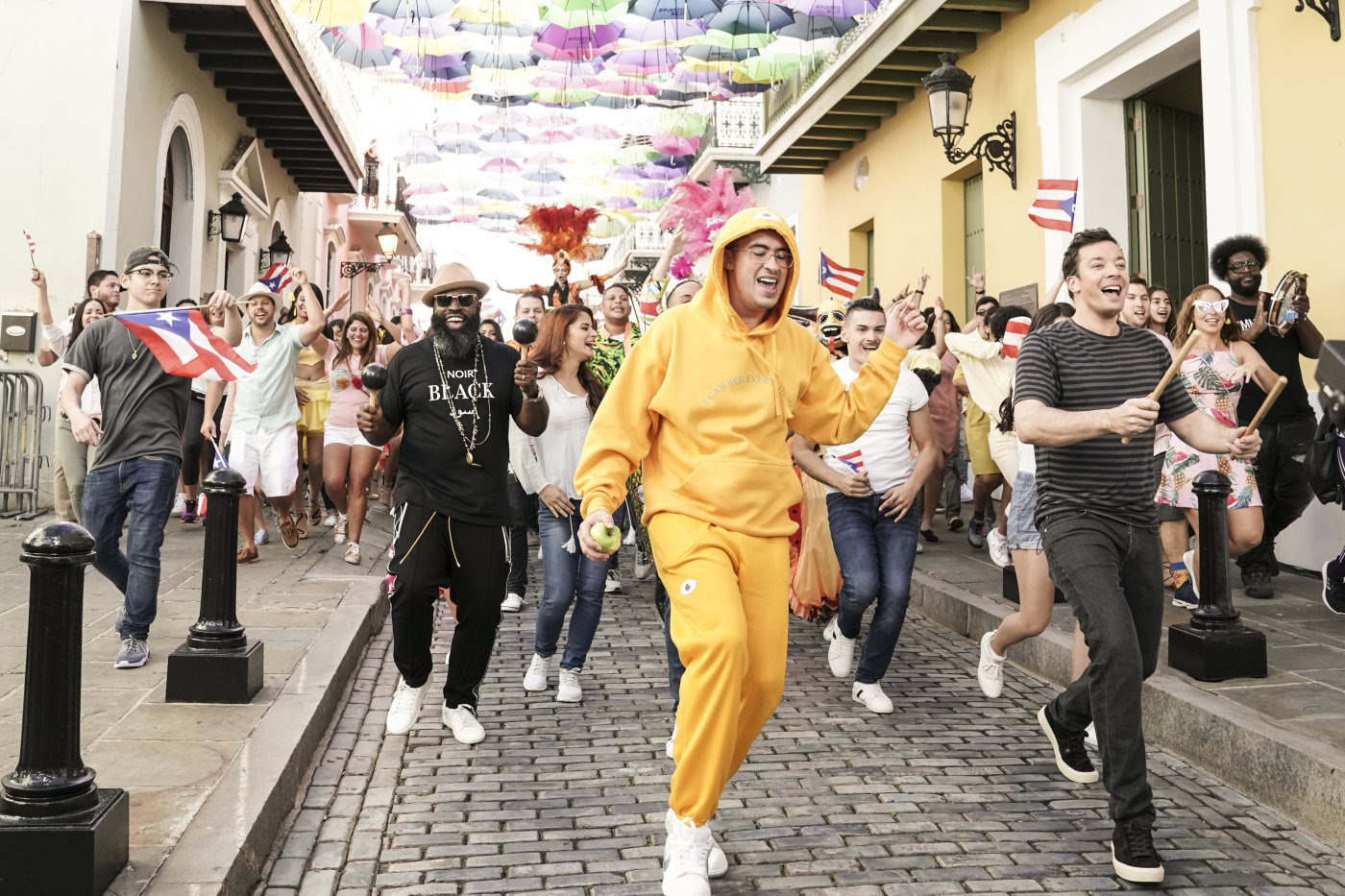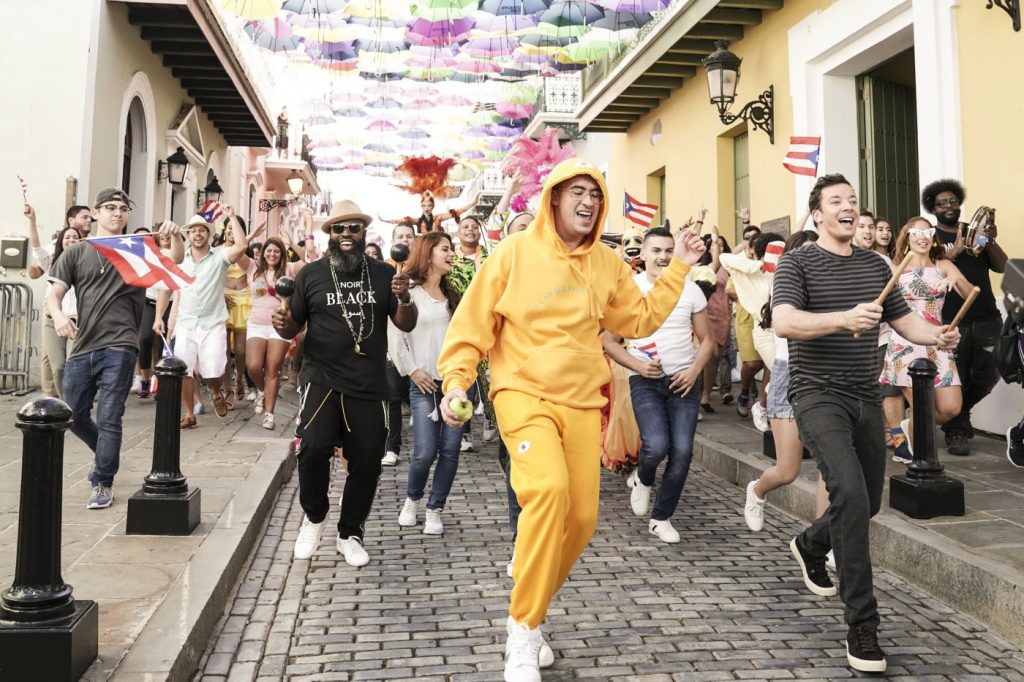It’s been almost a full month since Nochebuena, when San Benito dropped X100PRE, bestowing an unexpected holiday present upon the world. The coquito is gone and the pasteles have been swallowed, but Bad Bunny’s latest offering, his long-awaited full-length debut, has left a perpetual sparkle in the eyes of his followers. Fans across the globe have been blasting his genre-busting LP from car stereos to hookah lounges, catapulting Benito Antonio Martínez Ocasio to the top of Billboard’s Latin Albums chart, where the 24-year-old Puerto Rican trap en español lord has been comfortably perched for the last three weeks.
But just because El Conejo Malo has the whole world singing confidently que somos caro or reminiscing about those teenage paris de marquesina doesn’t mean listeners have caught every musical gem the album has to offer. Behind the masterful beats and sequencing of veteran reggaeton producer Tainy and engineer Robert “La Paciencia” Rosado and Bunny’s own tough-talk bars and emo refrains are cultural references only boris – or those who grew up with them – might pick up on. Between all of el orgullo del barrio’s smutty isla slang, here are some of the allusions to Puerto Rican cultura you might’ve missed, even if you’ve had X100PRE on repeat since Christmas.
1
“Ni Bien Ni Mal”
Bad Bunny opens his 15-track debut with the ukelele strums of “Ni Bien Ni Mal,” a solemn trap joint about his separation from a former love. Between frankly informing his ex that he’s fucked her homegirl and that there’s no reconciling their romance, he sings, “como dice Miky, no te voy a mentir,” a reference to fellow Puerto Rican trap artist Miky Woodz’ 2017 song “No Te Wa a Mentir.”
2
“200 MPH”
Even though El Conejo Malo teams up with Diplo on the seesawing “200 MPH,” he makes several nods to boricua culture through his lyrics. In the first verse of the boastful bop, Benito sings, “Dinero, dinero, me falta Wichy,” alluding to the main characters Dinero and Wichy in Talento de Barrio. Producer-star Daddy Yankee appeared in the 2008 film, which chronicled the story of a Puerto Rican drug dealer trying to escape the streets for a career in reggaeton. The poster boy of Latin trap also references Puerto Rican legends that came before him, like Nuyorican pianist and composer Richie Ray (“Me siento Ray, pero Richie”) and Puerto Rican salsa band La Sonora Ponceña’s song “Timbalero” (“Rumba buena, timbalero”), while also acknowledging santería, the Catholic- and Yoruba-derived religion practiced in Afro-Caribbean places like Puerto Rico, Cuba, and the Dominican Republic (“Ando de blanco entero, flow santero”).
3
“¿Quién Tú Eres?”
In the confrontational “¿Quién Tú Eres?” Bad Bunny comes for all of his haters, throwing jabs like “Tú robando Macy’s, yo en el desfile” and “Ustedes son mis hijos, pero los tuve que abortar.” Describing his power and lyrical prowess, he even name-drops Puerto Rican two-weight world boxing champ Iván Calderón Marrero (“Iván Calderón, pero peso completo”).
4
“Caro”
Benito follows the hostile “¿Quién Tú Eres?” by flexing about his wealth and undeniable talent. But El Conejito also touches on the importance of knowing your own self-worth, particularly when he brings Puerto Rican pop star Ricky Martin in for a hidden, gospel-like choral interlude.
5
“Ser Bichote”
X100PRE is loaded with bori slang, but perhaps no song displays this more prominently than “Ser Bichote,” the isla term for drug dealer or hood leader and the title of the album’s jittering eighth track. As Benito raps about always wanting to be the kingpin and making it as the new don of urbano, he gestures toward the “big boss” Daddy Yankee, sampling dialogue from Talento de Barrio, and nods to other predecessors like bori rap duo Lito & Polaco (“De chamaquito yo capeaba como Polaco”). The most impactful Puerto Rican reference on “Ser Bichote,” however, is directed at the government, when Benito calls out La Junta de Control Fiscal for closing down schools and creating the conditions for trap houses to grow (“To’ los que me critican, que se mueran juntos/Chorro ‘e hijo ‘e putas, resuelvan sus asuntos/Se cierran escuelas mientras se abren puntos”).
6
“Si Estuviésemos Juntos”
In the heart-rending reggaeton ballad “Si Estuviésemos Juntos,” Benito reminisces about a former love and wonders what could’ve been if he had gotten his shit together sooner. While slowed-and-throwed emo reggaeton has become the norm in recent years, back in the day, it was an anomaly. So it makes sense why El Conejo alludes to “Down,” the 2006 hit from Puerto Rican duo RKM & Ken-Y that deviates from the hypermasculinity of early 2000s urbano. He sings, “Escuchando Masterpiece, baby me siento down/Si no tengo de tu piel/Down.” The rapper also references De La Ghetto and Ñengo Flow’s remake of Chris Brown’s “Deuces.”
7
“Solo de Mi”
In his latest single “Solo de Mi,” another somber ballad, Bad Bunny sings about reclaiming your identity and finding self-love after walking away from an abusive relationship. The music video highlights the issue of domestic violence by portraying a bruised woman (played by Venezuelan actress Laura Chimaras) suffering from several invisible blows to her face. As the song speeds into an accelerated perreo, Bunny and his leading lady take to a Miami club dancefloor, where he raps, “Hoy e’ noche ‘e travesura/hoy e’ pata’ abajo,” a reference to Hector y Tito’s classic “Noches de Travesura.”
8
“Cuando Perriabas”
In “Cuando Perriabas,” El Conejo Malo takes it back to the dawn of Puerto Rican reggaeton, even sampling the genre’s fave sucios. Plan B’s “Bellaqueo” appears slowed and throwed, and the track also references Daddy Yankee’s 2004 jam “Donde Hubo Fuego” when BB sings, “Y bum, pa’ atrá’, bum-bum, pa’ alante/Este party es sólo para la gente que aguante.”
9
“La Romana”
Even though the most notable references on “La Romana,” Bad Bunny’s trapchata collab with Dominican dembow king El Alfa, are undeniably about La República Dominicana, the bori rapper still alludes to the talent of his own Caribbean isla, specifically Voltio and Residente’s “Chulin Culin Chunfly” when he sings, “Ojalái, ojalái que esta noche tú sea’ mi mai, eh, hey.”
10
“Como Antes”
Perhaps the most nostalgic track on X100PRE, “Como Antes” draws on memories from Bad Bunny’s childhood, from late-night Messenger chats to Pokemon Gold video games. On “Como Antes,” El Conejo makes a reference to the exact time of day he would sit down to watch Los Simpsons and the infamous Puerto Rican gossip show SuperXclusivo (“Los Simpsons a las cuatro, y pa’l cuatro, a las seis, ey”) in. And while it’s not a solely Puerto Rican reference, Benito even mentions the collectible Tazo discs that were found in Frito-Lay chip bags across Latin America in the 90s (“Me puse a jugar Tazo’/Ya no te vo’a hacer caso”).
11
“RLNDT”
“RLNDT” is one of the most emotionally vulnerable songs on X100PRE, tackling depression and that acute feeling of loneliness, confusion, and loss of self that accompanies it. While it’s easy for Spanish- and English-speaking listeners alike to pick up on the melancholy tone of the track, both might miss that “RLNDT,” a stylization of Rolandito, directly alludes to the disappearance of Rolando Salas Jusino. The Puerto Rican boy, whose went missing when he was five years old, captured the attention of the entire archipelago in 1999. He was never found, and detectives still know very little about his kidnapping.
12
“Estamos Bien”
“Estamos Bien” is a song about Puerto Rican resilience, speaking to the island and its people’s perseverance following Hurricane María and the local and federal government’s horrifyingly substandard response to the disaster. Bunny even references the state of the island many months after the storm hit, singing, “Aunque pa’ casa no ha llega’o la luz/gracias a Dios porque tengo salud.” But there are other bori cultural references as well, like his nod to Puerto Rican rock band La Banda Algarete’s song “Que Se Joda!” (“Joda, que se joda, que se joda, hey, hey”) and the notorious potholes that anyone who has driven in Puerto Rico is familiar with (“La Mercedes en P.R. cogiendo boquete, eh.”).
13
“MÍA”
Bad Bunny confidently ends his debut with his massive collaboration “Mía” with Drake, the banger that peaked at no. 5 on the Billboard Hot 100 and features the Canadian artist singing completely in Spanish. Benito references the star-crossed romance of Romeo and Juliet, singing, “Yo soy tu Romeo, pero no Santo,” at once signaling his not-so innocent interests in the object of his affection and shouting out Bori-Dominican bachatero Romeo Santos.




